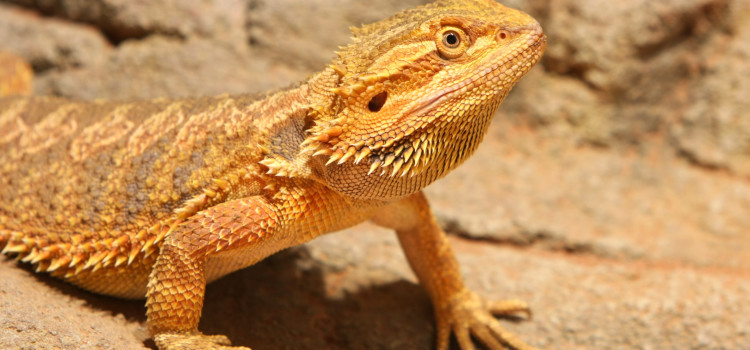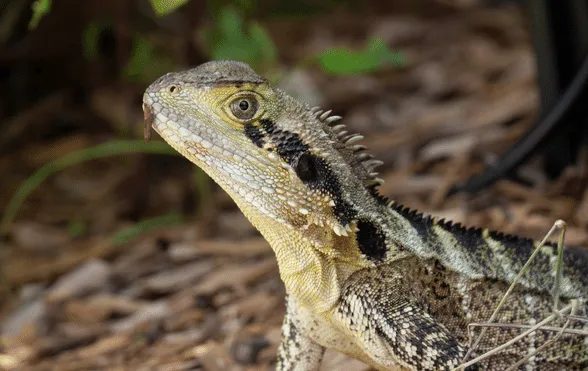Brumation is a hibernation like state that Bearded Dragons enter into, and is more common in the colder months. There are a number of steps you’ll need to follow, if your Bearded Dragon is ready to brumate.
Is your bearded dragon insured? Get a quote for £1,000 of vet fees, death and theft cover. Vet fee cover only also available | We’ve been insuring exotic pets since 1996 | Check out our customer reviews on Feefo.
Brumation in Bearded Dragons
More often than not, a point will come in a Bearded Dragon’s life where the need for brumation is necessary (a hibernation-like state that many cold blooded animals will partake in). In captivity, not all dragons will do this. But for many of us, the first time around can be a worrying time.
But, don’t worry. It’s a completely natural process. Done In the wild purely for survival. To get through the colder months, where less live food and plant life is prominent. So, they will sleep it off by making a burrow, and wait till the warmer months again. Living off their built up internal nutritional reserves.
This is something they have been doing for millions of years. So a few decades of captive breeding will not change this fact.
You may like to read: Bearded Dragon diet and food ideas
Bearded Dragon brumation signs
You can tell if your bearded dragon is in brumation because he may have the following symptoms:
- Sleeping more
- Appetite decreased
- Going to sleep earlier
- Hiding in the shade
- Pooing less (due to eating less)
Is your bearded dragon insured? Get a quote for £1,000 of vet fees, death and theft cover. Vet fee cover only also available
At what age do Bearded Dragons brumate?
You may like to read: Bearded Dragons shedding
When do Bearded Dragons brumate?
How long do Bearded Dragons brumate?
Brumation can last a few weeks, or up to four months.
What to do when your Bearded Dragon starts brumating
 You can help your Bearded Dragon to brumate
You can help your Bearded Dragon to brumate
Do I need to leave on the heating and UV during brumation?
In an word, no. Turning off the heat and UVB will not harm a healthy dragon at all. In fact, it’s exactly what would happen while in a burrow in wild conditions.
The burrow keeping them safe from cooler conditions on the surface. Bearded Dragons also block the entrance with dirt. This keeps them safe from any predators, but also means its very dark 24/7.
The only other thing I will do is cover the vivarium/tank’s glass with either paper, or a blanket. So it’s nice and dark for them. And I will check on them daily.
Can I feed my dragon during in brumation?
Nope. Due to the conditions of brumation (cooler, no heat, no UVB) not feeding is 100% part of the process.
You honestly don’t want a dragon with a belly full of food, sleeping for an extended period. This can cause life threatening issues with the food not digesting properly and rotting within their digestive system.
This is also the reason they will naturally avoid food while entering the brumation period. As they instinctively know the trouble a stomach full of food can cause them. So, follow their lead here.
Bearded dragon weight-loss during brumation
If you’ve followed the steps mentioned at the start – getting that vital vet visit done, the essential faecal test completed to rule out parasites/illness, and all is clear, then you should have a healthy dragon entering brumation.
A healthy Bearded Dragon won’t lose much weight during this period at all. Mine have lost around three or four grams on average, each time. And this is a common statistic among keepers that have experienced brumation in their dragons. It’s generally only if parasites or illness are present that any substantial weight-loss occurs.
So, weigh the dragon once or twice a week. Don’t worry, you wont disturb them much at all. Just do it quickly and efficiently.
Providing water to your Bearded Dragon while its brumating
A small water bowl (not big enough to lay in) should be available within your setup, regardless.
Just be sure to change the water a few times a week, and maybe put this small water bowl a little closer to the dragon (so more central as opposed to in the cool-end). The dragon will use it if needed.
But again, as per the food, they have evolved to get through the brumation process by living off their body reserves. They are not like you or I where we need the constant body fuel via food and hydration.
It’s also worth mentioning, when it comes to weight loss. A healthy Bearded Dragon won’t lose much weight during this period at all. Mine have lost around three or four grams on average, each time.
What happens when a Bearded Dragon is sleeping?
Bearded Dragons after brumation
Feeding your Bearded Dragon after brumation
As just mentioned. Although they may not eat during the first couple of waking days, when they do, they will want to eat you out of house and home. But, be sensible. Don’t let them gouge out. Greens and hydration should of course be offered, too.
Common questions I get asked:
Semi-Brumation in my Bearded Dragon
My Dragon has finished brumation after a few days
To Conclude
Please note: Any advice offered within this article is the opinion of Pete Hawkins.
ExoticDirect cannot be held responsible regarding the views expressed in this article.
You should always seek the advice of a vet if you are unsure regarding the care of your pet.
Versions of this article, albeit shorter ones, were originally printed on or in: The Reptile Apartment and Practical Reptile Keeping Magazine (November 2016 issues)
Pete Hawkins writes for ExoticDirect, Practical Reptile Keeping and the Reptile Apartment. He is also the admin for the Bearded Dragon Network and a range of other reptile Facebook groups.
Pete Hawkins may receive commission for pet insurance sales that result from you clicking on a link within this article.
Don’t miss out!
Sign up for our FREE monthly newsletter full of interesting content! And it’s spam free.
* indicates required field
ep`

